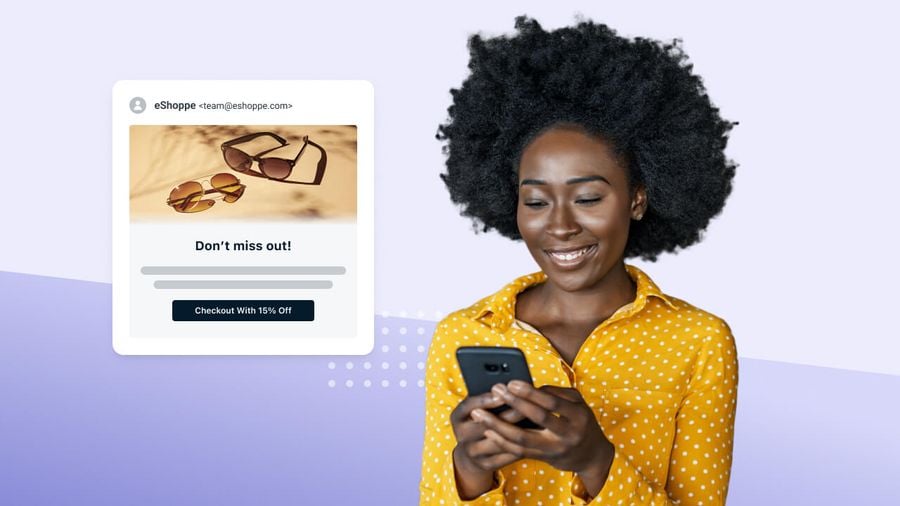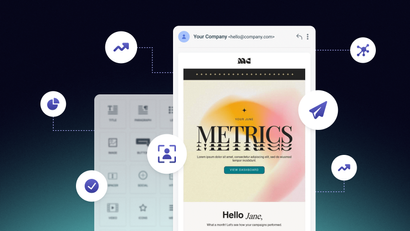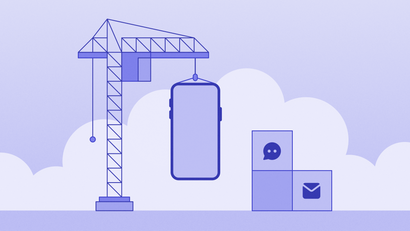At this point, abandoned cart emails are iconic in mobile marketing and eCommerce spaces. Companies can send abandoned cart emails when a user has failed to check out items in their online store, app, or other purchase platform.
What is the Purpose of a Cart Recovery Email?
The abandoned cart dilemma plagues the minds and souls of eCommerce brands, as abandoned cart stats remain high even through shopping holidays like Black Friday or Cyber Monday. In 2019, global cart abandonment on Black Friday reached 73.78 percent, while Cyber Monday saw cart abandonment rates of around 68.94 percent.
Even so, there are a variety of ways to make your abandoned cart notifications more compelling to customers in order to increase the chances that they will jump back in and finalize their transactions on your platform.
Measuring Success
Before you implement abandoned cart emails, you should benchmark your existing performance by establishing a baseline for the number of abandoned carts you experience and the total number of conversions you’re seeing month over month. This way, you can measure the effectiveness of your abandon cart email program to understand how it’s impacting your revenue.
Tracking email performance is crucial to streamlining your campaigns (and budget.) For a detailed look into email growth best practices, look no further than our guide to email optimization!
What click, engagement, and conversion rates are considered good for cart recovery emails?
Creating Benchmarks
Here are some high-level benchmarks to take a look at..
The average cart abandonment rate across all industries is 69.57 percent, according to Baymard Institute, which aggregates data from over 40 different studies.
On mobile, cart abandonment is even higher, averaging around 85 percent. This could be the case for various reasons, particularly because it can be tricky to design a mobile-friendly checkout process.
In addition, the average large-sized eCommerce site can gain a 35.26 percent increase in conversion rate through better checkout design.
Cart Recovery Email Stats
Here are average CTR, open, and conversion rates for abandoned cart emails across industries. When refining your sequences, aim to meet or exceed these averages.
Average Open and CTR’s for Abandoned Cart Emails
Benchmark your click-throughs, open rates, and percent of users who purchased after receiving and opening your abandoned cart email.
- Average CTRs range between 8-9 percent
- Average open rates are 45 percent
- Average conversion rates are 10 percent
6 Tips for Writing More Compelling Abandoned Cart Emails
Personalize Your Content
If you want your abandoned cart email campaigns to stand out, you’ll have to capture the attention of your customers with your subject line and pre-header. Try crafting a personalized subject line with a customer’s first name and the items that they’ve left hanging in their cart.
To execute this, you’ll need first to configure tags based on their checkout behavior.
2. Optimize Timing
Another important piece of abandoned cart personalization is setting a timeframe by which you hope to retarget these forgetful customers. For instance, you may customize this sequence by timezone so that your message is received at a time when users are likely to be active in their email platform.
It’s also a best practice to retarget cart abandoners within 1-2 days of their initial checkout attempt.
3. Consider Copy and Phrasing
Within your email copy, you’ll want to catch users’ attention with short, snappy, and urgent phrases. Urgency is a known psychological driver, after all. Depending on what aligns best with your brand voice, you can also get playful with your call to action and your pitch for users to reengage.
“Oh no! If you wait too long, you’ll miss out on cuddling your dinosaur plushie.”
“You have only 17 hours left until your offer expires”
You can also try adding social proof that validates that other customers are fans of the product they’ve abandoned. Customer reviews play an increasingly important role in the modern consumer’s decision-making process, so if you can include a direct quote or endorsement of the product in question, you’ll increase the chances that users will take action.
Another way you can address users’ hesitations in checking out with an item in their cart is by expressing the safety of their payment and a convenient returns policy. Addressing these pain points in your email copy can provide the reassurance your users need to complete the desired action.
4. Include Images and Think about your Layout
Another easy way to pique a user’s interest with your email is to include enticing images of the product or products a user has left abandoned. Dangling this low-hanging fruit over your customers’ heads is an excellent way to activate a visual and multi-sensory reaction, which will hopefully work to drive users over the edge and towards a purchase.
As a design best practice for your cart recovery emails, you should place the most important information first, or “above the fold.” These emails should be fairly straightforward in the content they communicate, so it’s important to use a simple, elegant, and intuitive design layout that clearly translates to the CTA you’re hoping for.
5. Implement a Responsive Design
Aim to make your abandoned cart emails both visually appealing and mobile optimized in order to increase the chances of engagement and opens.
Data shows that over half of email campaigns are opened on mobile devices and four out of ten emails are now opened through mobile applications. These figures on top of the fact that every year, more transactions are occurring on users’ mobile devices, it’s critical to design your abandoned cart email both for desktop and mobile viewing.
Responsive design is an approach to developing and designing for the wide variety of clients you want to send emails to. A responsive design adapts to users’ behavior, screen size, platform and orientation.
6. Offer a Discount
Another way you can more effectively drive conversions from your abandoned cart emails by offering your users an exclusive discount on the product or products in question.
You can phrase your deal as a last-chance, or time-sensitive offer to further incentivize quick action. Some businesses may benefit from pulling out the extra stop of offering a discount on a given set of items in their inventory if you’re trying to sell out a certain product category at the end of a certain season, for instance.
It may be worth whipping out a discount for exclusively seasonal products such as Halloween costumes, Christmas decorations, etc. Using promos or discounts as an additional push towards a user recovering their cart can be a valuable strategy for enhancing engagement with these campaigns.
Leveraging Other Channels Alongside Email
With an omnichannel messaging solution, It turns out that you can diversify your abandoned cart strategy beyond a single channel. Although email may be an excellent first choice for this type of retargeting campaign, you can further increase the chances that users reengage by testing other channels in the same campaign, or even by testing them against each other.
Consider using SMS and/or push within your cart recovery strategy. Both are more immediate than email and offer the advantage of reaching mobile-first users front and center.
Like email, SMS and push require a user’s explicit opt-in, which means you’ll have to collect consent separately for each additional channel. As SMS and push are much shorter mediums, you’ll also need to shorten your message significantly in order to fit with the character limits of these short-form channels.
Get Started with OneSignal
With OneSignal’s easy-to-use Journeys product, you can easily craft multi-touch cart abandonment campaigns using email, push notifications, and in-app messages to achieve heightened personalization and message visibility, all of which can increase the chances that users pull the trigger on a final purchase. You can automate these multi-step abandoned cart sequences with our no-code, intuitive Journeys builder.
Get Started for Free



